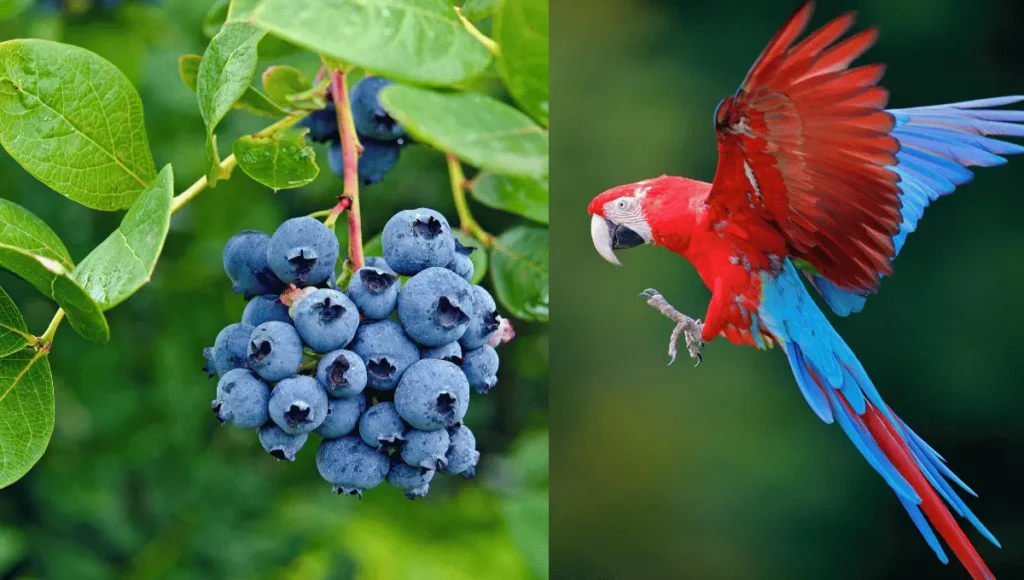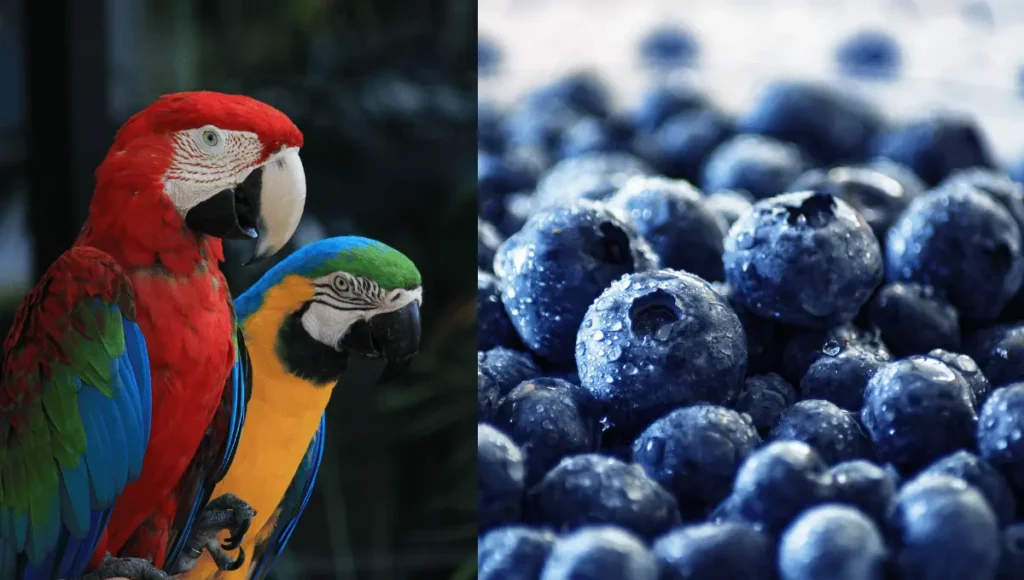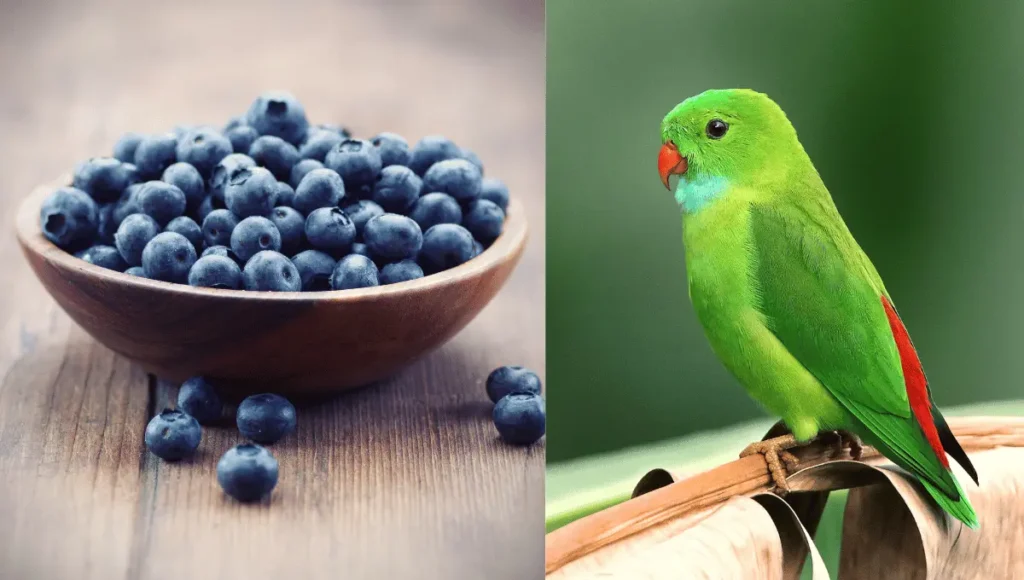Introduction
Parrots are known for their curiosity when it comes to food, but not every snack is safe for them. This brings us to a common question among parrot owners: can parrots eat blueberries? With their bright color and juicy flavor, blueberries for parrots seem like a tempting treat.
But are blueberries safe for parrots, and what are the health benefits of blueberries for parrots? In this article, we’ll explore how blueberries can fit into a parrot’s diet, any risks of feeding parrots blueberries, and the best way to serve them. Read on to find out everything you need to know about feeding blueberries to your parrot.
Are Blueberries Safe for Parrots?

Yes, blueberries are generally safe for parrots to eat. They are a natural fruit that offers essential vitamins and minerals, making them a healthy addition to a parrot’s diet when fed in moderation. Blueberries are low in calories and packed with antioxidants, which can support a parrot’s overall health.
However, it’s important to be mindful of a few factors. Blueberries should be washed thoroughly before feeding, as non-organic blueberries may carry pesticide residues that can be harmful to birds. Choosing organic blueberries, when possible, is a safer option, as they are grown without synthetic pesticides.
Another consideration is portion size. While blueberries are nutritious, they should be offered as an occasional treat, not a staple food. Feeding too many blueberries can lead to an imbalance in a parrot’s diet, as parrots need a variety of foods to meet all their nutritional needs.
Offering one or two blueberries a few times per week is generally a safe guideline for most parrot species.
Potential Allergies or Side Effects
Most parrots can enjoy blueberries without issues, but just like with any new food, it’s good to watch for any signs of allergies or digestive problems when introducing blueberries for the first time.
Symptoms like diarrhea, unusual feather plucking, or lethargy could indicate that blueberries aren’t agreeing with your parrot. If you notice any of these signs, it’s best to discontinue feeding blueberries and consult with a veterinarian.
Health Benefits of Blueberries for Parrots
Blueberries are not only safe for parrots but also packed with nutrients that can contribute to their health. When offered in moderation, these little berries provide a range of vitamins, minerals, and antioxidants that can support various aspects of a parrot’s well-being.
Nutrients in Blueberries
Vitamin C
Blueberries are a good source of vitamin C, which helps strengthen the immune system. For parrots, a stronger immune system means better resistance to infections and diseases. Although parrots produce some vitamin C naturally, adding a small amount through diet can offer an extra boost.
Vitamin K
Vitamin K is essential for blood clotting and bone health, and blueberries are a natural source of it. A steady intake of vitamin K helps parrots maintain strong bones, which is especially important for active and growing birds.
Antioxidants
One of the most beneficial components of blueberries is their high antioxidant content. Antioxidants work to protect a parrot’s cells from damage caused by free radicals, which are unstable molecules that can harm cells over time. By reducing cell damage, antioxidants can support a parrot’s longevity, heart health, and brain function.
Fiber
Blueberries are packed with fiber, which helps support healthy digestion. Fiber can help prevent constipation and promote regular bowel movements in parrots. A small amount of fiber can go a long way in supporting a parrot’s digestive health, especially for birds that consume a varied diet.
How These Nutrients Benefit Parrots

Including blueberries in a parrot’s diet provides a boost of nutrients that can support overall health and wellness. The immune-enhancing effects of vitamin C, the bone-strengthening power of vitamin K, and the cell-protecting properties of antioxidants all work together to keep parrots healthy and active.
Fiber aids in maintaining a balanced digestive system, which is essential for absorbing nutrients from other foods.
Parrots Eat Blueberries
| Aspect | Details |
| Can parrots eat blueberries? | Yes, parrots can eat blueberries in moderation. |
| Nutritional benefits | Blueberries are rich in vitamins (like Vitamin C), antioxidants, and fiber, which can be beneficial for parrots’ health. |
| Serving size | Small amounts; a few berries at a time. Overfeeding can cause digestive upset. |
| Preparation | Wash thoroughly to remove any pesticides, and serve fresh or frozen. |
| Frequency | Serve as an occasional treat, not a daily staple. |
| Toxicity concerns | Blueberries are not toxic to parrots, but as with any food, overconsumption should be avoided. |
| Best suited for | Most parrots, including budgies, cockatiels, and African greys, can enjoy blueberries. |
| Potential risks | Too many blueberries can cause diarrhea or digestive issues due to the sugar content. |
Risks and Precautions When Feeding Blueberries

While blueberries can be a healthy treat for parrots, there are a few risks and precautions to keep in mind. Feeding blueberries safely involves choosing the right berries, washing them well, and offering them in moderation.
Avoiding Pesticides and Contaminants
One of the main concerns with blueberries is the possibility of pesticide residues. Non-organic blueberries are often sprayed with pesticides, which can be harmful to parrots if ingested. To reduce this risk:
- Wash blueberries thoroughly under running water before giving them to your parrot. This can help remove surface chemicals and contaminants.
- Consider organic blueberries if possible, as they are grown without synthetic pesticides. While organic berries can still have traces of natural substances, they are generally a safer choice for pets.
Moderation and Portion Size
Even though blueberries are healthy, feeding too many can lead to dietary imbalances. Parrots need a varied diet to meet all their nutritional needs, and too much fruit, including blueberries, can crowd out other essential foods. Here’s how to manage portions:
- Provide blueberries as an occasional snack, rather than a daily part of your parrot’s diet. One or two blueberries a few times per week is generally safe for most parrots.
- Consider your parrot’s size when deciding the portion. Smaller parrots like budgies need less, while larger parrots like macaws can handle slightly more.
Risks of Overfeeding and High Sugar Content
Blueberries, like most fruits, contain natural sugars. While the sugar in blueberries is lower than in some fruits, it can still add up if given in large amounts. Too much sugar can lead to weight gain, digestive upset, or even metabolic problems in parrots.
By feeding blueberries in moderation, you can help prevent these potential health issues.
How to Serve Blueberries to Parrots

Blueberries are a great treat for parrots, but how you serve them can make a big difference in how much your bird enjoys them. To start, always make sure to wash the blueberries thoroughly before giving them to your parrot.
This will help remove any dirt, chemicals, or pesticide residues that could be harmful to your bird. If possible, it’s best to choose organic blueberries, as they are grown without pesticides.
You can serve blueberries whole, but depending on the size of your parrot, it may be easier for them to eat if you cut the berries into smaller pieces. Smaller parrots might appreciate blueberries that are halved or quartered, while larger parrots can manage whole berries. If your parrot has difficulty eating whole fruits, you can also mash or crush the blueberries to release their juice.
This makes it easier for your bird to enjoy, and it’s also a good option if you want to mix the blueberries into their regular food or sprinkle them on top of their bird-safe pellets.
To make the experience more exciting for your parrot, you can serve blueberries in different ways. Parrots love variety, so mixing blueberries with other bird-safe fruits like apples, grapes, or strawberries can create a colorful and flavorful fruit salad.
This not only provides a variety of tastes but also different textures that can keep your parrot entertained. Another fun idea is to hide blueberries in foraging toys or puzzles. This encourages your parrot to use its natural foraging instincts and keeps them mentally and physically active as they search for berries.
If it’s a hot day, you can freeze blueberries to create a cool treat for your parrot. Freezing whole or mashed blueberries in an ice cube tray is a simple way to provide a refreshing snack. Your parrot will love the cool, juicy burst of flavor on a warm day.
While fresh blueberries are the best choice, you may also wonder about frozen or dried blueberries. Frozen blueberries can be offered as a treat, especially in hot weather, but make sure to let them thaw a bit before feeding them to avoid any choking hazards.
Dried blueberries, on the other hand, should be avoided unless they are specifically labeled as safe for birds. Many dried fruits contain added sugars or preservatives that are harmful to parrots, so it’s best to stick with fresh or frozen options.
Conclusion

In conclusion, blueberries can be a delicious and healthy treat for your parrot when given in moderation. Blueberries are full of vital nutrients, including vitamins, antioxidants, and fiber, which can help boost your bird’s overall health.
However, it’s important to serve them safely by washing them thoroughly and offering them in the right portion sizes. By incorporating blueberries into a balanced diet and serving them in different fun ways, you can provide your parrot with a tasty snack that also benefits their overall well-being.
As long as you follow these simple guidelines, blueberries can be a great addition to your parrot’s diet.
FAQs
Can parrots eat blueberries every day?
While blueberries are safe for parrots, they should be given in moderation. A few blueberries a few times a week is enough to provide the health benefits without overloading your bird with sugar.
Are blueberries safe for all types of parrots?
Yes, blueberries are safe for most types of parrots. However, always monitor your parrot the first time you introduce blueberries to ensure they don’t have an allergic reaction or digestive issues.
Do I need to remove the skin of blueberries before feeding them to my parrot?
No, you do not need to remove the skin of blueberries. Just be sure to wash them thoroughly to remove any dirt or pesticides before offering them to your parrot.
Can frozen blueberries be given to parrots?
Yes, frozen blueberries are safe to feed your parrot, especially in warmer weather. Just let them thaw a bit before serving to avoid any choking hazards.
Are dried blueberries safe for parrots?
It’s best to avoid dried blueberries unless they are specifically labeled as safe for parrots. Dried fruits often contain added sugars or preservatives that can be harmful to birds.
Pingback: Can Parrots Eat Mango? Health Benefits and Feeding Tips
Pingback: Can Parrots Eat Peanut Butter? The Truth Revealed!
Pingback: Can Parrots Eat Cashews? Safe Snacking Guide for Your Bird
Pingback: Can Parrots Eat Nutritional Yeast: Is It Safe and Healthy?